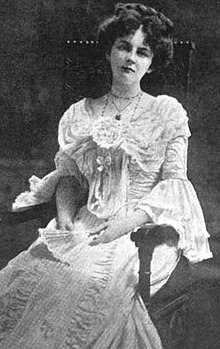Editha Aceituna Thurlow Griffin
Editha Aceituna Thurlow Griffin | |
|---|---|
 E. Aceituna Griffin, from a 1906 publication | |
| Born | Editha Aceituna Thurlow 12 July 1876 Gibraltar |
| Died | 10 June 1949 Kensington |
| Occupation | Writer |
| Known for | Mystery and historical romance novels |
| Relatives | George Dodd (grandfather) |
Editha Aceituna Thurlow Griffin (12 July 1876 – 10 June 1949) was a British writer, usually credited as E. Aceituna Griffin. She was the author of more than a dozen mystery and historical romance novels.
Early life
[edit]Editha Aceituna Thurlow was born in Gibraltar, the daughter of British parents, Edward Hovell Thurlow and Georgina Violet Dodd Thurlow. Her father was a cavalry officer. Her grandfather George Dodd was a Member of Parliament.[1][2] Her middle name, spelled in various ways in British records, is a Spanish word for "olive".
Career
[edit]Griffin wrote murder mysteries and historical romances. Books by Griffin included Lady Sarah's Deed of Gift (1906),[3] A Servant of the King (1906),[4] Mrs. Vanneck (1907),[5] The Tavistocks (1909),[6] Pearl and Plain (1927),[7] Amber and Jade (1928),[8] Genesta (1930),[9] Conscience (1931),[10] Delia's Dilemma (1934),[11] Motive for Murder (1935, co-written with her daughter Joy Griffin),[12] The Punt Murder (1936),[13] Commandments Six and Eight (1936),[14] Sweets and Sinners (1937),[15] and Where There Is a Will (1939).[16] She also wrote stories in the same genres, including "The Spectre of the Severn Tunnel" (1899), "Selling Off" (1900), "Pride of Race" (1901),[17] and "The Nemesis of a Crime" (serialized in 1939).[18] She was also reported to have written two short plays.[19]
Griffin's earlier novel The Tavistocks was described approvingly in an Australian newspaper as "free from maudlin sentiment, and upholds a high moral and conventional tone".[20] But another Australian reviewer believed her novel Mrs. Vanneck "possesses none of the graces that should adorn a character study, but nearly all the faults that can distress a reader, even if he only reads for amusement."[21] A 1936 British review of her Motive for Murder found the novel "sophisticated" and "with almost sinister competence."[22]
Personal life
[edit]Editha Aceituna Thurlow married army officer Robert Chaloner Griffin (1871–1954) in 1905. They lived in Berkshire and had a son, Robert (1906–1990), and a daughter, Ursula Mary Joy (1913–1973, known as Joy). E. Aceituna Griffin died in 1949, aged 72 years, at her home in Kensington.[2]
References
[edit]- ^ Debrett's Peerage, Baronetage, Knightage, and Companionage: Comprising Information Concerning All Persons Bearing Hereditary Or Courtesy Titles, Knights, and Companions of All the Various Orders, and the Collateral Branches of All Peers and Baronets. Dean & Son, Limited. 1902. p. 796.
- ^ a b Kemp, Sandra (1997). Edwardian fiction : an Oxford companion. Charlotte Mitchell, David Trotter. Oxford: Oxford University Press. ISBN 0-19-811760-4. OCLC 36011549.
- ^ "News Notes" The Bookman 30(May 1906): 46.
- ^ Griffin, E. Aceituna (1906). A servant of the king. William Blackwood & Sons.
- ^ Griffin, Aceituna (1907). Mrs. Vanneck. George Bell and Sons.
- ^ Griffin, E. Aceituna (1909). The Tavistocks.
- ^ Griffin, Aceituna (1927). Pearl and Plain. Longmans, Green and Company.
- ^ Griffin, Aceituna (1928). Amber and Jade. Longmans, Green and Company, Limited.
- ^ Griffin, Aceituna (1930). Genesta. John Murray.
- ^ Griffin, Aceituna (1931). Conscience. John Murray.
- ^ Griffin, Aceituna (1934). Delia's dilemma. London.
- ^ Griffin, Aceituna (1935). Motive for murder. Sampson Low & Company.
- ^ Griffin, Aceituna (1936). The Punt Murder. Sampson Low, Marston & Company, Limited.
- ^ Griffin, Aceituna (1936). Commandments six and eight. London.
- ^ Griffin, Aceituna (1937). Sweets and sinners. London.
- ^ Griffin, Aceituna (1939). 'Where there is a will ... '. London.
- ^ Thurlow, E. Aceituna (1901). "Pride of Race". The Royal Magazine. 6: 458–461.
- ^ Thurlow, Aceituna (19 June 1939). "The Nemesis of a Crime". Waikato Times. p. 5. Retrieved August 25, 2021 – via Papers Past.
- ^ "Bookstall and Study". The Star. 1930-02-12. p. 5. Retrieved August 25, 2021 – via Papers Past.
- ^ "How Women Love". Register (Adelaide, SA : 1901 - 1929). 1908-08-22. p. 9. Retrieved 2021-08-26 – via Trove.
- ^ "Mrs. Vanneck". Western Mail (Perth, WA : 1885 - 1954). 1908-02-08. p. 50. Retrieved 2021-08-26 – via Trove.
- ^ Torquemada (1936-02-16). "New Novels: Six Sound Mysteries". The Observer. p. 7. Retrieved 2021-08-26 – via Newspapers.com.
